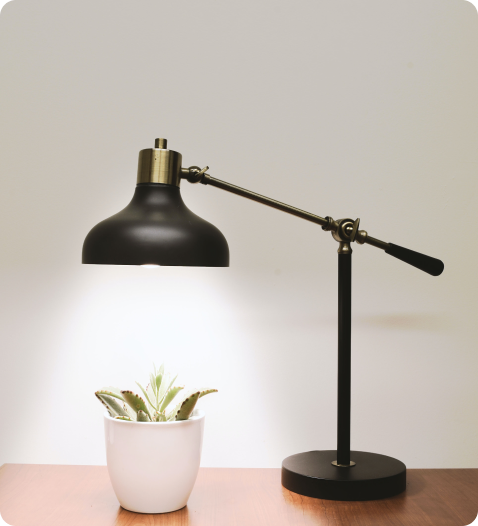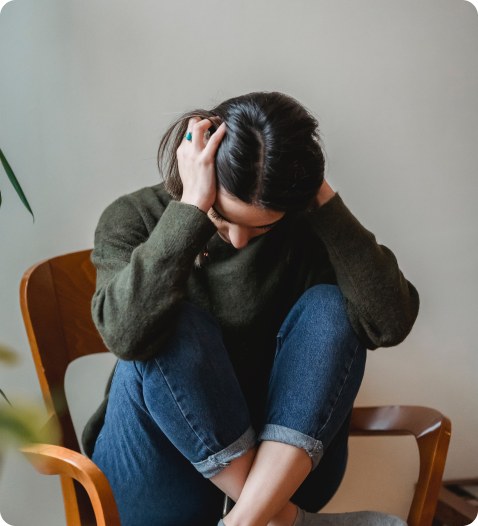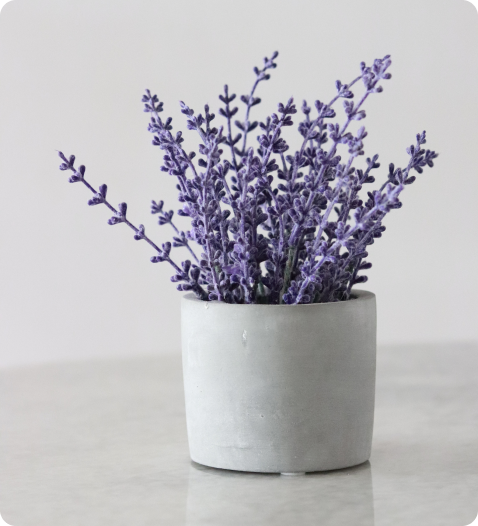Creating a comfortable space for your needs can promote feelings of relaxation and reduce stress. This may be particularly helpful for a proportion of people with lupus who also have a condition called fibromyalgia. Fibromyalgia is a condition of heightened sensitivity to pain, which produces tenderness to touch that would not normally cause pain along with symptoms of fatigue, poor sleep and often depression. Many people with fibromyalgia also experience sensitivity to other sensory input, such as changes in temperature, harsh artificial lighting, noise, or fragrances. To learn more about ways to create a more neutral sensory environment, search the topics below.
Lighting
Back to topFluorescent lighting distributes a limited spectrum of blue light that some people may find irritating. Among people who experience migraines, fluorescent lighting may be associated with eye strain or headaches. Blue light is also emitted from electronic devices such as TV screens, smartphones, and computer screens. The light from fluorescent bulbs or from electronic devices such as laptops may flicker which some believe may be a source of irritation. Strategies to reduce eye irritation from lighting:
- Use soft LED lighting or dimmer lights in your home. Lamp shades may provide an additional layer of filtration.
- Take breaks from looking at screens for several minutes at least every 30 minutes to one hour.
- Talk to your workplace about alternate lighting options.
- Small studies suggest that blue light filtering lenses may help reduce symptoms of eye strain, headaches, blurred vision and dry eyes from viewing digital screens. However, other studies found the use of such glasses did not make a difference in symptoms of sleep quality or eye health.
Noise
Back to topSounds such as air conditions, paper rustling, or other loud noises may provoke a feeling of anxiety or disturbance among some people with sensory sensitivity. This sensitivity may be disruptive, so you may wish to seek strategies to gradually integrate sensory experiences in a way to adjust your degree of responsiveness.
Some people may also find it helpful to create a home environment with less noise disruption or variation. Some find it helpful to:
- Use a white noise machine or turn on a fan to create soft noise
- Wear noise-reducing headphones or ear plugs
- Find ways to insulate windows or doors to reduce outside noise
Scents and Fragrances
Back to topSensitivity to fragrances and chemicals
Strong fragrances or chemicals may be irritating or cause allergic reactions among some people. It is often helpful to choose products that are free from these scents or additives to avoid extra exposures to potentially irritating chemicals. Some people find strong smells, such as perfume or certain food odors, to be unpleasant and may even trigger discomfort. A third of the general population identify as sensitive to chemicals and between 1-5% of people feel this sensitivity impacts their health or function. Some report certain odors are associated with fatigue, headaches, difficulty concentrating, or lightheadedness. Studies have found that people who report very high sensitivity to smells or chemicals experience higher levels of anxiety and depression. Treatment of mood problems may be helpful in reducing sensory sensitivity and improving function. Learn more about strategies to address mood in the modules: Managing emotions, Reframing, Relaxation.. Consider these other ways to reduce exposure to certain odors:
- Select cleaning products that are perfume free * Avoid using perfumes or scented lotions * Avoid areas with high pollution or second-hand smoke
Do essential oils have health benefits?
Data to support the use of essential oils for health conditions is inconsistent. In the general population, clinical trials have investigated the use of essential oils for anxiety, depression, and sleep disturbance with some showing benefit, while others showing none. No clinical trials have been performed to study the effects of essential oils in people with lupus.
When used safely, the risks may be low, and some may find benefits of essential oils to help create a calming environment, stress or some symptoms such as headaches. For example, lavender may be helpful for stress reduction or sleep promotion and lemon oil may help promote energy and boost mood.
Safety Issues of Essential Oils
Essential oils are not regulated, so the quality and content of oils can vary significantly. It can be difficult to know if the product contains what is on the label because there is no governmental testing to verify the claims of the product. This means unlabeled contaminants may be listed that could cause allergic reactions.
- Look for oils in dark colored glass bottles. This will reduce the evaporation of the oil.
- Look for oils that are from a reputable company that has been in business for several years. The label should include the scientific name of the plant and where the plant was grown to help verify its authenticity.
- Oils can be expensive because it often takes a large amount of plants, fruits or nuts to generate even a small amount of essential oils. When looking for oils, if you find a very inexpensive oil, it may be diluted with other fillers.
Oil pens or sticks contain an absorbent material that holds the essential oils inside a covered container that can be opened and used when needed. They are usually small and portable. There are also wearable accessories such as necklaces or keychains that contain a compartment to place a few drops of oils to an absorbent surface.
It is also best to avoid direct application of oils onto the skin as they may cause irritation, chemical burns, or allergic reactions.
Oils used in a diffuser may affect different people in different ways, so if there are multiple people living in your household, it may be best to avoid these devices. Some people are highly sensitive to strong smells and may find that they can even aggravate pain, headaches, or discomfort. Diffusers may harbor bacteria so may contribute to respiratory issues or infections. Some essential oils are harmful to pets, so best to check with your veterinarian before using them around your animals.
Talking to Your Doctor About Sensory Sensitivity
Back to topIf you feel your sensitivity to sensory input is affecting your health or function in negative ways, talk to your doctor. Sensory sensitivity is frequently associated with anxiety and depression, and it may help to talk to your doctor for mental health treatment. Learning and behavioral specialists may suggest strategies called sensory integration therapy to lessen the impact of sensory input. Occupational therapists may also provide effective interventions for sensory sensitivities using low-challenge physical activity and message.
References:
- Wilbarger JL, Cook DB. Multisensory hypersensitivity in women with fibromyalgia: implications for well being and intervention. Arch Phys Med Rehabil. 2011;92(4):653-656. doi:10.1016/j.apmr.2010.10.029
- Dabrowiecki A, Villalobos A, Krupinski EA. Impact of blue light filtering glasses on computer vision syndrome in radiology residents: a pilot study. J Med Imaging (Bellingham). 2020 Mar;7(2):022402.
- Lawrenson JG, Hull CC, Downie LE. The effect of blue-light blocking spectacle lenses on visual performance, macular health and the sleep-wake cycle: a systematic review of the literature. Ophthalmic Physiol Opt. 2017 Nov;37(6):644-654.








